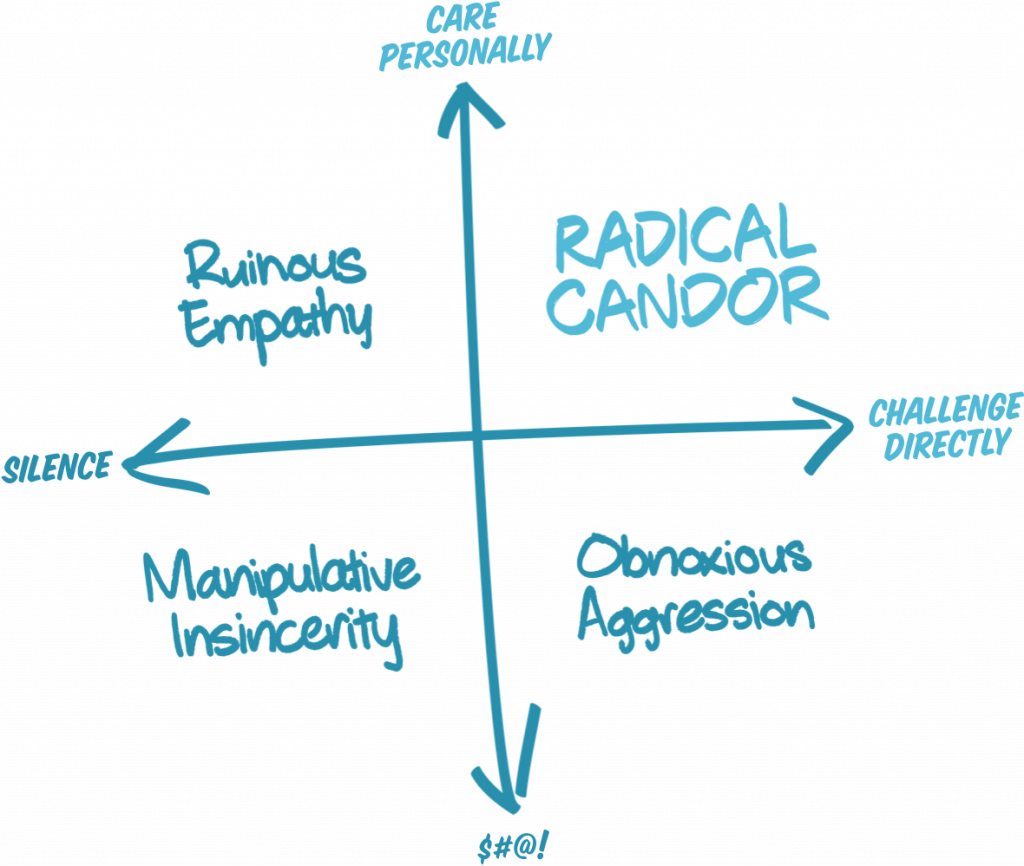Radical Candor: How Strategy Labs creates an empowering work culture
Jump To:
Honesty is the best policy — but not always the easiest. And if we’re being frank, this is especially true at work.
Saying what we really think and addressing conflict at work doesn’t come naturally to many of us. Personal and work relationships, as beneficial as they are, come with inevitable challenges: miscommunication, contrasting opinions, disappointments, and more.
It’s all too easy to react to these challenges with either brutal honesty that breeds resentment or with avoidance that prolongs the problems. So how do you find that middle ground to keep your team on track — addressing issues while fostering positivity?
We believe it’s Radical Candor. Our Strategy Labs leaders encourage it in every meeting and practice it in their management. It’s the foundation of our open, honest & respectful company culture. Here, we break down the philosophy so you can apply it to your team.
What is Radical Candor?
Radical Candor was coined by Kim Scott in her bestselling 2017 book, “Radical Candor: Be a Kick-Ass Boss Without Losing Your Humanity.” Her communication framework emphasizes caring personally while challenging directly. It encourages professionals to build stronger relationships by both caring for team members and clients as people while providing clear, constructive feedback — even when it’s uncomfortable.
The four-quadrant framework of communication styles
Scott introduces a 2x2 framework that evaluates communication styles across two axes, ranging from:
insensitive aggression (or “$#@!” per the graph) to caring personally (empathy, respect, humanity)
silence (avoiding confrontation) to challenging directly (honesty, clarity, accountability)
When problems arise, the goal is to land in the Radical Candor quadrant shown below.
Here’s how each quadrant looks in practice:
1. Radical Candor: You care personally + challenge directly.
What it looks like: You tell someone their work isn’t meeting the mark, but share that you believe they can improve and offer the resources for them to get there.
Why it works: Builds trust & confidence while encouraging better performance.
2. Ruinous Empathy: You care personally, so you don’t challenge.
What it looks like: You withhold criticism to spare someone’s feelings.
Why it fails: Allows poor performance to continue and surprises the teammate when they do receive criticism (“I didn’t know I was doing anything wrong!”).
3. Obnoxious Aggression: You challenge directly and don’t care personally.
What it looks like: Brutally honest feedback that comes off as hostile or belittling.
Why it fails: You know why — have you liked being treated this way? This behavior damages relationships, breeds resentment, and is detrimental to long-term performance.
4. Manipulative Insincerity: You neither care personally nor challenge directly.
What it looks like: Backstabbing, passive-aggressive behavior, or fake praise.
Why it fails: This destroys trust entirely, hindering performance and employee retention.
Clearly, every team needs a good dose of Radical Candor to move forward and achieve its goals. So how can you bring the philosophy to your workplace?
At Strategy Labs, our rule of thumb is to use Radical Candor all the time! This way honesty and respect become bedrocks of our company culture, rather than occasional practices.
However, we’re all human. It’s easy to get caught up in the moment and veer toward those other three communication quadrants. You can stay on track by reminding yourself and your team to incorporate Radical Candor in the following scenarios:
When giving feedback: Be specific, timely, and sincere. Focus on behaviors, not personalities. Share at least one piece of positive feedback in addition to constructive criticism.
When receiving feedback: Model openness to differing opinions. Welcome criticism and act on it. Aim to not take it personally, but view the feedback through a lens of business or organizational needs.
During performance reviews: Highlight your colleague’s strengths and position criticisms as growth areas. Be clear on what needs to change, business reasons why, and offer to help them improve.
In 1:1s and team meetings: Foster a culture where both caring and challenging are normalized. If something is broken, address it and ask for your teammates’ thoughts on the issue. Ask for thoughts on new policies or recently completed work. Brainstorm together and create an action plan.
When you should use Radical Candor
4 unique ways we practice Radical Candor
Anonymous surveys: Our HR team conducts anonymous employee surveys through Bamboo HR. Every quarter, team members complete a general wellness survey and an organizational feedback survey.
Biannual performance reviews: Each team member answers prompts to identify successes, strengths, and areas of growth before meeting for discussion. Team members across the agency may also share anonymous feedback on an individual’s performance, which is taken into account or shared in reviews.
Shoutouts: Radical Candor includes sharing meaningful praise with others, and we like to celebrate the wins on our team in each weekly meeting. Anyone is able to speak up and commend another team member for something they did in the previous week. We’ve even conducted surveys about shoutouts in the past — Strategy Labs team members overwhelmingly expressed appreciation for this mood-boosting weekly ritual.
Everyday reminders: The best way to practice Radical Candor is to invite it into everything you do. At Strategy Labs, it’s simply our M.O. So it’s not unusual to hear a department leader start a meeting or conversation with “Please use Radical Candor here, don’t be afraid to speak up” — and then actually listen and act on what is shared.
When committing to Radical Candor you get something pretty unique for a marketing agency: transparency, supportive culture, and sustainable success. Of course, the communication philosophy can be applied at any company or in any relationship. Give it a try! We think you’ll like the results.
One of our core values at Strategy Labs is open communication. We intentionally work to build a culture where everyone is empowered to have a voice and we can respectfully engage in honest conversations.
Here are some ways we do just that:
Questions on how we foster a positive & productive team culture?

